‘Weak tea’: G20 fails to agree on cutting down fossil fuels
One expert says there was a ‘clear backtracking on previous commitments’ made by the bloc last year

The meeting between the energy ministers of the world’s 20 richest countries ended with a “disappointing” outcome that has been branded by experts as “weak tea” and a reneging of commitments made by them last year.
The G20 countries, in their latest meeting held in India’s tourist state Goa, failed to reach a consensus on cutting down fossil fuels amid globally record-shattering heatwaves and rising climate concerns.
With just two months to go for the main G20 summit in September and four months for the Cop28 UN climate summit in Dubai, this meeting was seen as a crucial temperature gauge for the geopolitics of the urgent need for energy transition.
Cutting down planet-heating fossil fuels is becoming an increasingly urgent call as back-to-back heatwaves caused by the climate crisis have led to record temperatures in large parts of the northern hemisphere with Europe, China and the US sweltering in unprecedented heat this year.
However, experts said that when the world needed to hear a “clarion call to action”, the outcome of the meeting turned out to be “weak tea”.
“With temperature records being set daily around the world and the impacts of climate change spiralling out of control, the world needed to hear a clarion call to action from the G20 energy ministers meeting that just wrapped up in Goa,” said Alden Meyer, senior associate at environmental think-tank E3G.
“Instead, what we got was very weak tea indeed, with the failure to set strong goals and implementation plans for at least tripling deployed renewable energy capacity worldwide by 2030 and sharp divisions on display around the need for a fair, fast, and equitable transition away from fossil fuels.”
One of the biggest points of contention during the meeting was the call to cut down all fossil fuels, the emissions from which are heating the world. However, this issue has remained highly challenged in international climate negotiations.
While at the Cop26 Glasgow summit in 2021, all countries agreed with the language to phase down coal, ministers at the G20 meeting failed to reiterate the commitment to accelerate the phasedown of unabated coal generation.
Anusha Mata, senior policy advisor at E3G, said it showed there are “clear divisions among energy leaders on the pathway to securing a clean energy future.”
“The weak language on fossil fuel phase down and absence of any mention of coal – the most polluting energy source – is a clear backtracking on previous commitments in last year’s G20 Bali Declaration,” she said.

The debate over the phasing out of fossil fuels, which is becoming all the more urgent with recent climate extremes, has been a long-standing dispute in international climate negotiations.
India, a coal-reliant country and the host of the G20 summit this year, has been demanding that countries should agree to cut down all fossil fuels, including oil and gas, instead of just singling out coal.
Experts said the ongoing dispute resulted in a watered-down language in the final outcome on fossil fuels and tripling of renewable energy capacity. They said it also showed the Dubai presidency for the upcoming Cop summit has a long way ahead to build consensus on key issues.
“The fight over energy pathways seems to be a continuation of the disagreement at Cop27 over phasing down ‘all fossil fuels’, which India supported because it wanted oil and gas to be treated similarly to coal, which the world agreed to phase down – but not phase-out – at Cop26,” said Tarun Gopalakrishnan, pre-doctoral fellow at the Climate Policy Lab, Centre for International Environment Policy.
“As expected, India had to settle for language, for eg tripling of RE has been changed to ‘tripling of clean technology capacity’ and phasing down of all fossil fuels has been watered down. This has been the best diplomatic solution, but it is not the best climate policy solution.”
However, some progress was made, as countries agreed to step up energy efficiency and deployment of distributed renewable energy technologies as well as recognise the need for low-cost finance for clean energy transition in developing countries.
But Mr Meyers said the Indian G20 presidency “must not accept this outcome as the final answer”.
“Instead, it should push G20 leaders to put the interests of their people ahead of those of the fossil fuel industry when they meet in September for their summit in Delhi,” he said.
“The UAE’s incoming Cop28 presidency now has an even clearer sense of the fault lines among major countries in reaching the transformational outcome it is seeking for the Dubai climate summit in December and must intensify its discussions with ministers and leaders in the weeks ahead.”
Join our commenting forum
Join thought-provoking conversations, follow other Independent readers and see their replies
Comments





Bookmark popover
Removed from bookmarks